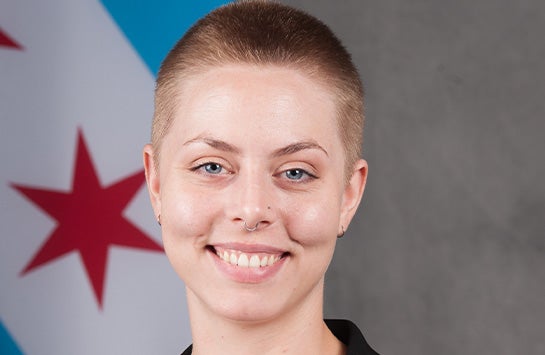How UIC’s Master of Public Administration Program Helped Rachael Everson Grow Their Career in Public Service
How UIC’s Master of Public Administration Program Helped Rachael Everson Grow Her Career in Public Service

The University of Illinois Chicago’s Master of Public Administration (MPA) program prepares students to become effective leaders in government, nonprofit organizations, and other public service roles. The program provides a strong foundation in data analysis, policy evaluation, and organizational leadership.
Rachael Everson, a graduate of the Master’s in Public Administration, came to UIC with a background in nonprofit administration and community development through arts and culture. Through the program, they developed the technical skills necessary to transition into the public sector. After working with the Chicago Park District, they are now stepping into a new role at the Chicago Public Library, where they will help design and implement citywide programming. In this interview, Rachael shares how the MPA program helped shape their career path and offers advice for prospective students considering the program.
Can you tell us about your work and educational background?
I originally studied English and theater with concentrations in creative writing, playwriting, and acting. I mention this to highlight that you don’t necessarily need direct experience in public policy or political science to complete the MPA program successfully. Before pursuing my Master’s in Public Administration, I spent about five years working in the nonprofit sector in Chicago, primarily in fundraising for arts and culture organizations. I worked with the Chicago Public Library Foundation, which sparked my interest in the intersection of public and private funding for cultural institutions. That experience and my exposure to Chicago’s rich arts and culture sector led me to consider a master’s degree in public administration. I knew I didn’t want to pursue an MBA because I’m a very mission-driven person. The idea of working in the private corporate sector has never appealed to me. I prefer working in the public sector, where I feel like I’m contributing to a higher sense of service.
After graduating from the MPA program, I worked in the Chicago Park District’s Planning and Construction Department in a strategic support role, focusing on cultural planning and public art. Now, I’m transitioning into a new role at the Chicago Public Library. I’ll work closely with the First Deputy Commissioner and her senior programming team to design and implement citywide programming. My role will also include acting as a liaison to external community partners and major cultural institutions, and supporting CPL’s strategic initiatives.
Why did you choose the UIC’s Master of Public Administration Program?
I started my MPA at another university but quickly realized I wasn’t getting the tactical, hard skills I wanted to develop, like statistics, data analysis, and policy evaluation. That’s when I started looking at other programs and found UIC’s MPA program. At UIC, I was able to work with my professors to make sure my coursework, from projects and reports to my overall portfolio, was geared toward my interests and career goals. By the time I graduated, I had a professional portfolio that included not only academics but also research, policy analysis, and program development work for the Mayor’s Office.
What are the most valuable skills you gained through the MPA program, and how have they contributed to your current work?
Before joining the MPA program at UIC, I had never taken a statistics course or learned how to code. Through my time in the program, I gained essential technical skills, including program and policy analysis, and stronger writing abilities.
While at UIC, I pivoted my career from nonprofit administration to the public sector. I worked as a fellow in the Chicago Mayor’s Office, where I could apply the skills, I was learning, like GIS, directly to my work. The program gave me a tactical lens to approach my career, equipping me with the expertise I needed to successfully transition from nonprofit administration into public service.
Which MPA courses resonated with you the most, and why?
One course that stood out to me was Public Administration 561: Intergovernmental Management, which I chose as an elective. It’s something that many people don’t necessarily get direct exposure to but understanding how municipal governments work together is essential in public administration. This course gave me insight into intergovernmental agreements, funding structures, and how different agencies collaborate on large-scale projects.
That knowledge has been directly helpful in my career. While working at the Park District, I was involved in projects related to tax increment financing (TIF) and intergovernmental agreements for major infrastructure initiatives. I also learned how federal policies intersect with local government projects, such as the National Environmental Policy Act (NEPA). The course helped me bridge the gap between theory and practice, making me a more effective public administrator.
What advice do you have for a prospective MPA student?
My main advice is to get enough sleep! If you’re pursuing a Master’s in Public Administration online while working, especially balancing full-time or part-time employment, planning your time carefully is essential. I was a full-time employee and part-time student, and it required a lot of planning to dedicate myself to my studies fully. The more effort you put into the program, the more you will get out of it. Graduate school is much more self-directed than undergraduate studies.
Additionally, I wish I had taken more program analysis and data analytics courses. I think the more you can bolster your resume and articulate some of those quantitative metrics within your career, the more it will benefit you in the long term. It’s important to think strategically about what course you want to take to ensure you gain the right professional skills. While you should follow your areas of interest, you can always apply those within your courses and coursework.